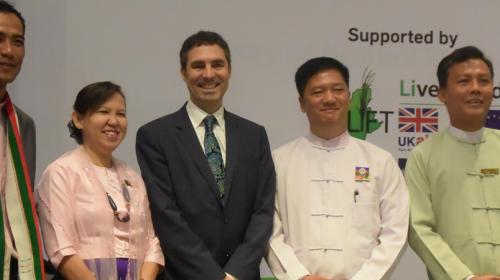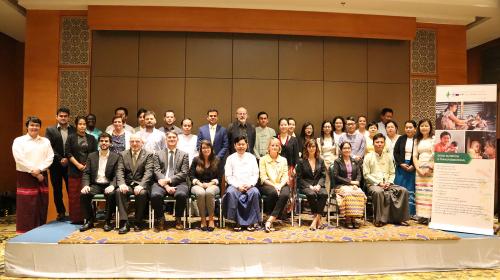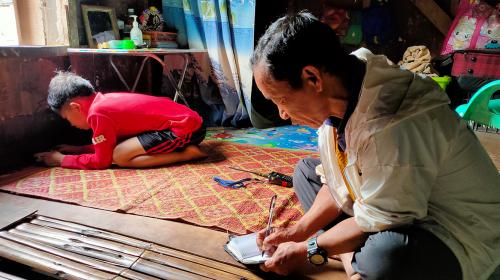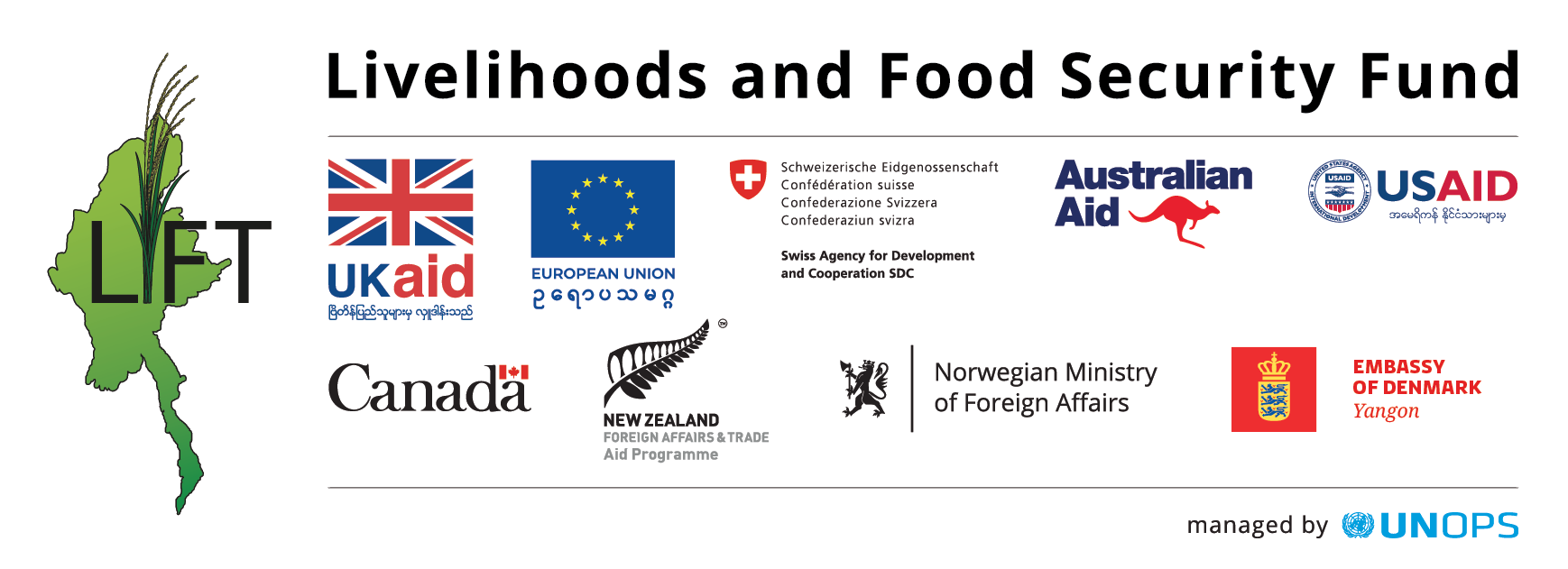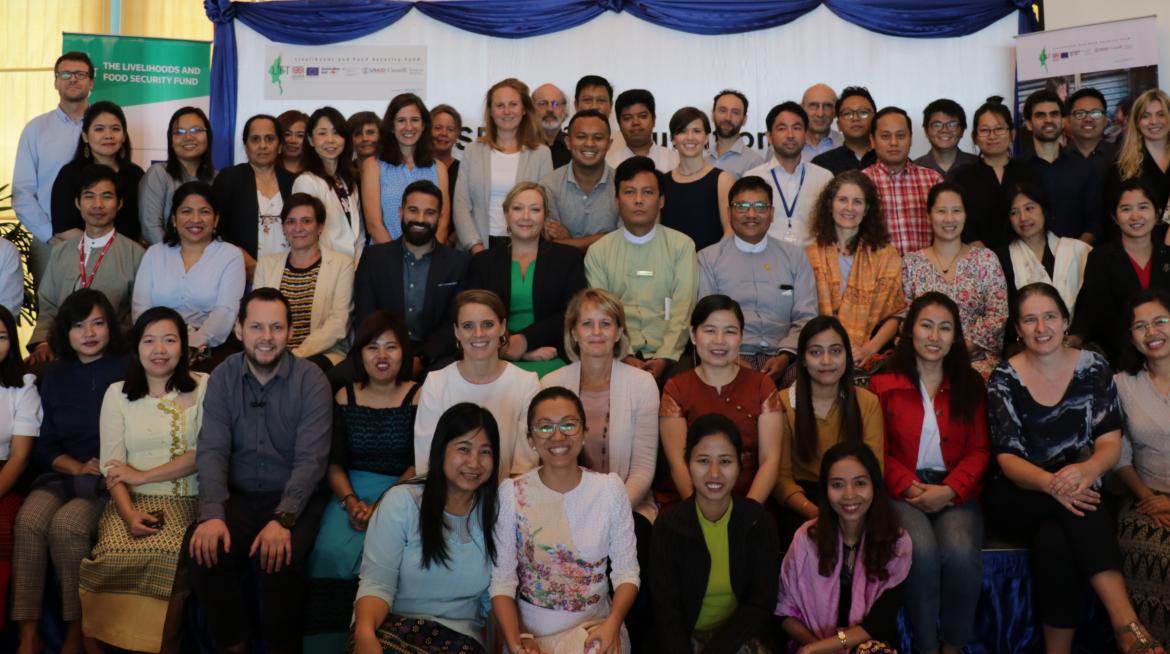
What are some opportunities and challenges for linking social and behaviour change communication (SBCC) and maternal and child cash transfer (MCCT) programmes? How does this contribute to positive nutrition outcomes in a child’s first 1,000 days? What is the best way forward for MCCT programmes?
These and other questions were raised at the event that brought together LIFT, the Ministry of Social Welfare, Relief and Resettlement, the Ministry of Health and Sports, and nutrition partners and donors on 19 February. The gathering featured presentations on the Randomised Control Trial (RCT) results of the MCCT programme in the Central Dry Zone and findings from recent reviews on the process and modalities used in Myanmar as well as discussions with key stakeholders on SBCC activities in MCCT programmes.
Malnutrition in Myanmar among highest in region
Poor nutrition in early life can harm children’s physical and cognitive development, with long-term consequences on earnings, productivity, and ultimately, a country’s growth. Myanmar has one of Asia Pacific’s highest rates of stunting, with one in three children below five years of age suffering from stunting or chronic malnutrition. Severe poverty is a key underlying factor which can lead to poor maternal, infant and child nutrition, micronutrient deficiencies, and repeated infections during the child’s first 1,000 days of life, which can have long term impacts on a person’s health.
Good nutrition leads to economic development
Good nutrition is transformational. Children who get the right nutrition in the first 1000 days are 10 times less likely to die of childhood diseases, complete more grades at school, and earn up to 21 per cent more as adults.
U Kyaw Lin Htin, Director of the Department of Social Welfare, opened the conference with a speech highlighting the importance of improving nutrition in Myanmar: “Cash transfers for nutrition outcomes are a smart investment; with benefits for the mother, the child and the country. But cash alone is not enough to change the practices and behaviours needed to impact on nutrition; it requires the effort of many stakeholders”.
LIFT and partners’ work on MCCT-SBCC programme
Since 2014, LIFT has been working to develop and test MCCT programmes in Myanmar through a range of projects led by Save the Children and the International Rescue Committee (IRC). The projects were consciously designed to test different approaches and means of delivery in order to inform how the MCCTs could be taken to scale. These experiences were critical to the ongoing evolution of the Government-led MCCT programme.
One of the approaches tested within the MCCT programme was cash+SBCC activities. It combines monthly cash allowances to mothers and various interventions aimed at enabling and informing people's behaviours and practices relating to health, sanitation and hygiene, maternal diets, breastfeeding, and so on. The purpose is to enhance the nutritional outcomes of pregnant mothers and young children during their first 1,000 days.
SBCC interventions combine elements of interpersonal communications such as home visits; community mobilisation activities including mother-to-mother support groups and sessions with husbands and grandmothers; and advocacy to support individuals, families, communities, and institutions. The aim is for LIFT, in collaboration with the country’s health system, to support families and communities to adopt and maintain high-impact nutrition-related practices.
MCCT-SBCC programme reduced stunting from 30 to 26 per cent in three years
On 19 February, LIFT presented the results of the research conducted by Innovations for Poverty Action and Save the Children, which showed that while the distribution of cash alone can have some benefits, far greater and significant impact has been recorded when cash is combined with SBCC. There are multiple pathways on which the cash transfer programme aims to improve nutrition outcomes in the first 1000 days. Improving a household’s income through a cash transfer accompanied by social behaviour change approaches helps break down the barriers to good nutrition practices.
SBCC approaches can influence ways in which cash has a positive impact on nutrition. The MCCT-SBCC programme can facilitate the uptake of health and nutrition services, promote health-seeking behaviours and healthy food choices for mothers and children. SBCC approaches can also increase women’s knowledge, skills and self-efficacy, as well as enhance family and community members’ knowledge, awareness and ability to support women.
According to research conducted in the Central Dry Zone, results of cash transfers combined with SBCC in efforts to reduce stunting are encouraging. LIFT implemented the project in communities in which stunting in children under five stood at 30 per cent, indicating a trend of long term chronic malnutrition. Within only three years of implementation, however, this number shrank by four percentage points to 26. The Government is now rolling out the programme and aims to provide universal coverage of MCCT with SBCC in seven states by the end of 2020. As the data from the Central Dry Zone speaks to the effectiveness of the approach, it can inform and guide the future Government-led MCCT programme.
WRITER: Sandra Vedeld

